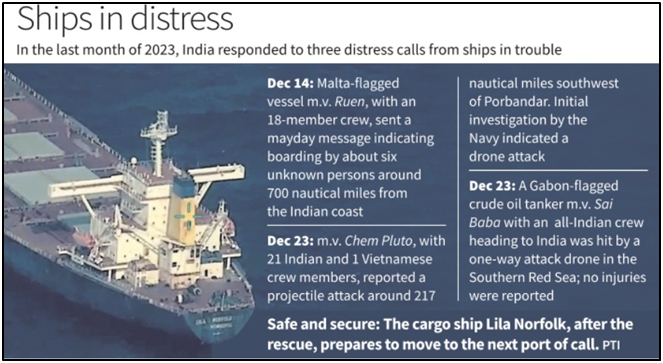Indian Navy thwarts hijacking attempt in Arabian Sea
06-01-2024
11:10 AM
1 min read

What’s in today’s article?
- Why in news?
- What is Maritime Piracy?
- What are the threats posed by maritime piracy?
- Steps taken by India to combat maritime piracy
- News Summary: Indian Navy thwarts hijacking attempt in Arabian Sea
- Key highlights
- Recent hijacking incident in the region

Why in news?
- Indian warship INS Chennai and its marine commandos thwarted the attempted hijack of a Liberia-flagged merchant vessel.
- It safely rescued its 21 crew members, including 15 Indians, in north Arabian Sea.
Maritime Piracy
- As per the UN Convention on the Law of the Sea (UNCLOS), maritime piracy is when people on a private boat or ship commit crimes like kidnapping, violence, or robbery for personal gain.
- UNCLOS is an international treaty which was adopted and signed in 1982 in Montego Bay, Jamaica
- It lays down a comprehensive regime of law and order in the world's oceans and seas establishing rules governing all uses of the oceans and their resources.
- This happens on the open sea and is targeted at another vessel or its people and property.
Threats posed by maritime piracy
- Physical Harm, Kidnapping and Associated Humanitarian Concerns:
- Pirates can physically harm crew members and passengers, and they often kidnap individuals for ransom.
- Crew members and passengers may experience trauma and psychological distress as a result of piracy incidents
- Disruption of Trade
- Piracy can disrupt maritime trade routes, causing delays in the delivery of goods and impacting global trade.
- Economic Losses
- Businesses may suffer financial losses due to stolen cargo, ransom payments, increased insurance premiums, and the cost of implementing anti-piracy measures.
- Impact on Fishing Industry
- Pirates sometimes target fishing vessels, affecting the livelihoods of fishermen and the availability of seafood.
- Environmental Risks
- Pirates may engage in illegal activities, such as oil theft or dumping pollutants, posing environmental threats to marine ecosystems.
- Security Concerns
- The presence of piracy raises security concerns for coastal regions and international waters, requiring increased naval and maritime security efforts.
- Global Security
- Piracy can be linked to broader security issues, such as terrorism and organized crime, creating challenges for international security.
Steps taken by India
- Operational steps
- Indian govt has deployed naval ships with armed helicopters to patrol the piracy prone areas.
- The Indian Navy commenced anti-piracy patrols in the Gulf of Aden from October 2008.
- In recent years, task Groups comprising destroyers and frigates have been deployed to undertake maritime security operations and render assistance to merchant vessels in case of any incident.
- Also, aerial surveillance by long-range maritime patrol aircraft and Unmanned Aerial Vehicles has been enhanced to have a complete maritime domain awareness.
- India participates in the various multilateral fora set up to combat piracy
- The Regional Cooperation Agreement on Combating Piracy and Armed Robbery against Ships in Asia (ReCAAP) is a government-to-government agreement that aims to enhance multilateral cooperation among 16 regional countries.
- The Regional Maritime Security Initiative (RMSI) is a partnership between regional nations with varying capabilities and capacities.
- Institutions created by India
- The Navy’s Information Management and Analysis Centre (IMAC) and Information Fusion Centre for Indian Ocean Region (IFC-IOR) are institutions involved in maintaining maritime security.
- Besides, Indian Navy also coordinates with Coast Guard to maintain enhanced surveillance within the Exclusive Economic Zone (EEZ).
- Legislative steps
- India enacted the Maritime Anti-Piracy Act, 2022 to give effect to arrest and prosecute pirates and strengthen the fight against piracy.
- Also, the government’s SAGAR (Security and Growth For All in the Region) Doctrine provides a framework for maritime co-operation in the Indian Ocean region.
News Summary
- Indian Navy secured and safely evacuated all 21 crew members, including 15 Indians, from the merchant vessel Lila Norfolk after it came under a hijacking attempt.
Key highlights
- The ship, Lila Norfolk, sent a message via the UK Maritime Trade Operations portal when it was about 460 nautical miles off the coast of Eyl, Somalia.
- The message reported a possible boarding by five to six unknown armed individuals.
- In response, the Indian Navy diverted the INS Chennai, a destroyer on anti-piracy patrol nearby.
- Additionally, a Maritime Patrol Aircraft (MPA) flew over the ship in the morning and made contact, ensuring the safety of the crew.
Recent hijacking incident in the region
- There have also been a series of attacks on merchant ships by Houthi rebels in Yemen in the Red Sea as well as the Arabian Sea.
Q1) What is the Regional Cooperation Agreement on Combating Piracy and Armed Robbery against Ships in Asia (ReCAAP)?
The Regional Cooperation Agreement on Combating Piracy and Armed Robbery against Ships in Asia (ReCAAP) is the first government-to-government agreement that addresses the incidence of piracy and armed robbery in Asia. The ReCAAP initiative aims to enhance multilateral cooperation among sixteen regional countries.
Q2) What is the United Nations Convention on the Law of the Sea (UNCLOS)?
The United Nations Convention on the Law of the Sea (UNCLOS) is an international agreement that establishes a legal framework for marine and maritime activities. It was adopted in 1982 and defines the rights and obligations of States Parties with respect to the maritime environment.
Source: Indian Navy thwarts hijacking attempt in Arabian Sea | IDSA | Times of India


